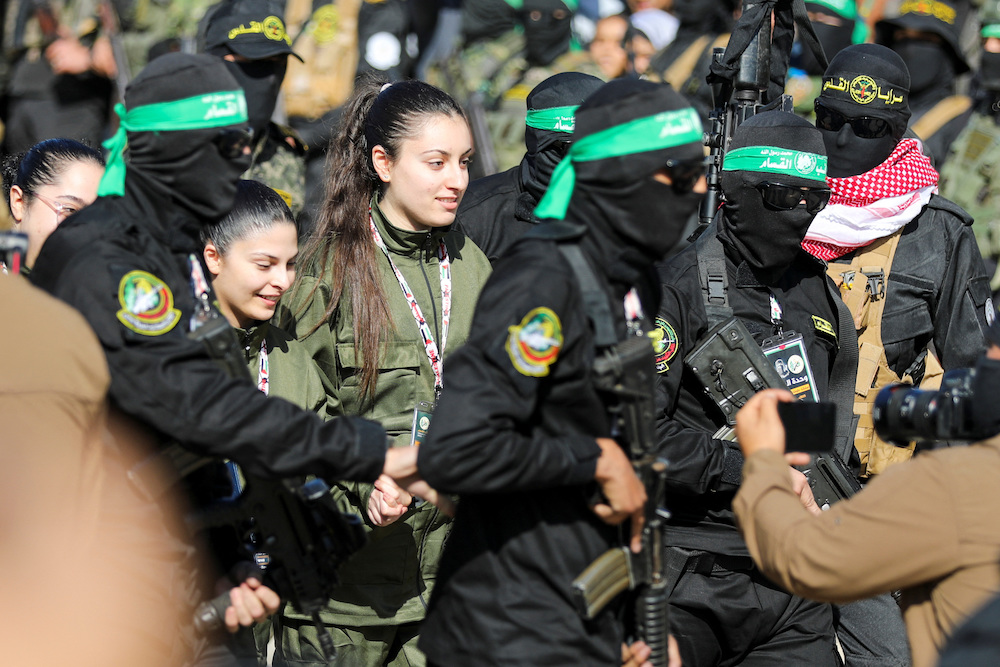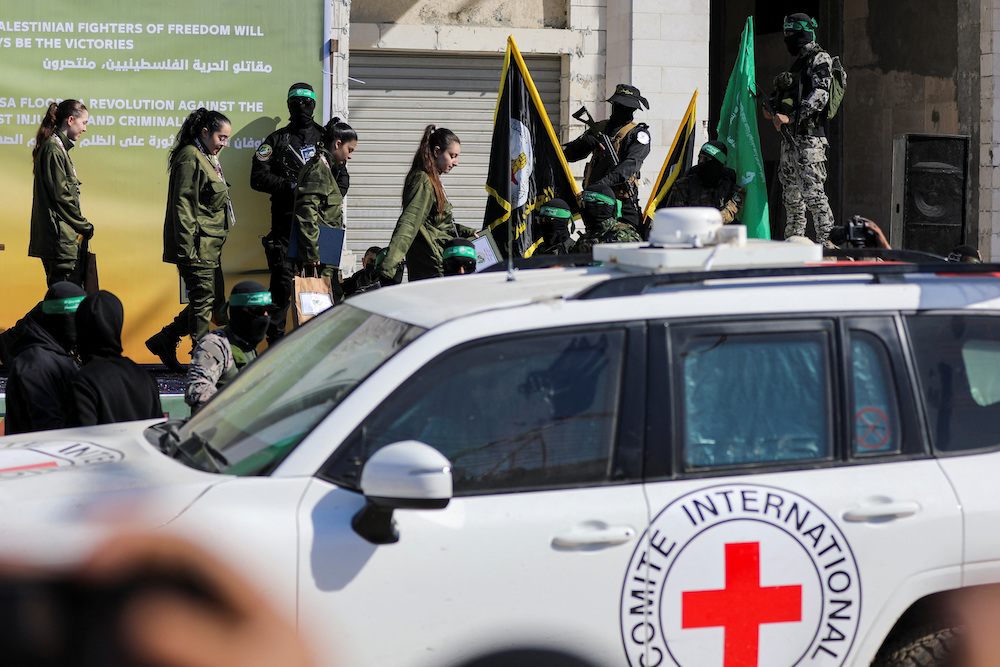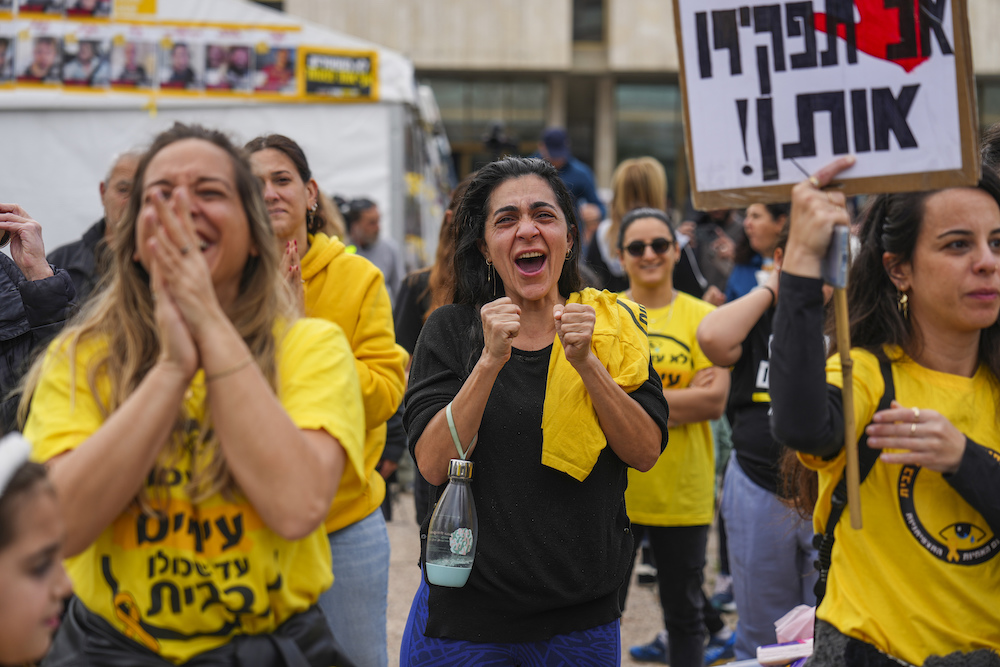DUBAI: The outgoing chief of Israel’s Mossad intelligence service has offered the closest acknowledgment yet his country was behind recent attacks targeting Iran’s nuclear program and a military scientist.
The comments by Yossi Cohen, speaking to Israel’s Channel 12 investigative program “Uvda” in a segment aired Thursday night, offered an extraordinary debriefing by the head of the typically secretive agency in what appears to be the final days of Prime Minister Benjamin Netanyahu’s rule.
It also gave a clear warning to other scientists in Iran’s nuclear program that they too could become targets for assassination even as diplomats in Vienna try to negotiate terms to try to salvage its atomic accord with world powers.
“If the scientist is willing to change career and will not hurt us anymore, than yes, sometimes we offer them” a way out, Cohen said.
Among the major attacks to target Iran, none have struck deeper than two explosions over the last year at its Natanz nuclear facility. There, centrifuges enrich uranium from an underground hall designed to protect them from airstrikes.
In July 2020, a mysterious explosion tore apart Natanz’s advanced centrifuge assembly, which Iran later blamed on Israel. Then in April of this year, another blast tore apart one of its underground enrichment halls.
Discussing Natanz, the interviewer asked Cohen where he’d take them if they could travel there, he said “to the cellar” where “the centrifuges used to spin.”
“It doesn’t look like it used to look,” he added.
Cohen did not directly claim the attacks, but his specificity offered the closest acknowledgement yet of an Israeli hand in the attacks. The interviewer, journalist Ilan Dayan, also seemingly offered a detailed description in a voiceover of how Israel snuck the explosives into Natanz’s underground halls.
“The man who was responsible for these explosions, it becomes clear, made sure to supply to the Iranians the marble foundation on which the centrifuges are placed,” Dayan said. “As they install this foundation within the Natanz facility, they have no idea that it already includes an enormous amount of explosives.”
They also discussed the November killing of Mohsen Fakhrizadeh, an Iranian scientist who began Tehran’s military nuclear program decades ago. US intelligence agencies and the International Atomic Energy Agency believe Iran abandoned that organized effort at seeking a nuclear weapon in 2003. Iran long has maintained its program is peaceful.
While Cohen on camera doesn’t claim the killing, Dayan in the segment described Cohen as having “personally signed off on the entire campaign.” Dayan also described how a remotely operated machine gun fixed to a pickup truck killed Fakhrizadeh and later self-destructed.
Cohen described an Israeli effort to dissuade Iranian scientists from taking part in the program, which had seen some abandoned their work after being warned, even indirectly, by Israel. Asked by the interviewer if the scientists understood the implications if they didn’t stop, Cohen said: “They see their friends.”
They also talked about Israel’s operation seizing archival documents from Iran’s military nuclear program. Cohen said 20 agents, none Israelis, seized material from 32 safes, then scanned and transmitted the documents before successfully sneaking them out.
“It was important to us that the world will see this, but this thing should also resonate with the Iranian leadership, to tell them, ‘Dear friends: One, you have been infiltrated. Two, we are (watching you). Three, the era of ... lies is over,’” Cohen said.
Media in Israel operate under a decades-old policy that requires journalists to clear stories involving security matters through military censors. That Cohen’s remarks apparently cleared the censors suggests Israel wanted to issue a new warning to Iran amid the Vienna nuclear negotiations.
Iran has repeatedly complained about Israel’s attacks, with Iran’s ambassador to the IAEA Kazem Gharibabadi warning as recently as Thursday that the incidents “not only will be responded decisively, but also certainly leave no option for Iran but to reconsider its transparency measures and cooperation policy.”
Iran’s mission to the United Nations did not immediately respond to a request for comment over the comments by Cohen, who was replaced by former operative David Barnea. Cohen in the interview acknowledged he might one day seek the prime minister’s office himself.
Outgoing Mossad chief signals Israel behind Iran nuclear attacks
https://arab.news/27dcq
Outgoing Mossad chief signals Israel behind Iran nuclear attacks

- The comments by Yossi Cohen offer an extraordinary debriefing by the head of the typically secretive agency
- In July 2020, a mysterious explosion tore apart Natanz’s advanced centrifuge assembly, which Iran later blamed on Israel
70 freed and ‘deported’ Palestinian prisoners reach Egypt: state-linked media

Al-Qahera News, which is linked to state intelligence, said the prisoners were those “deported” by Israel, adding they would be transferred to Egyptian hospitals for treatment.
According to a list previously made public by Israeli authorities, more than 230 Palestinian prisoners to be released under the deal are serving life sentences for deadly attacks on Israelis, and will be permanently expelled from the Palestinian territories upon their release.
Broadcasted footage on Saturday showed some of the prisoners, wearing grey tracksuits, disembarking from two buses on the Egyptian side of the Rafah border crossing with Gaza.
After transiting in Egypt, the deported prisoners “will choose either Algeria, Turkiye or Tunisia” to reside, Amin Shuman, head of the Palestinian prisoners’ affairs committee, told AFP.
“It’s an indescribable feeling,” one of those released told Al-Qahera News, smiling and waving from the window of the bus.
The prisoners transferred from the Ktziot prison in Israel’s Negev desert into Egypt are part of a group of 200 prisoners released Saturday in exchange for four Israeli hostages freed by Hamas militants in Gaza.
Police kill a man who set himself on fire outside a Tunisian synagogue

- The man advanced toward a law enforcement officer while ablaze, and a second officer opened fire to protect his colleague
- The officer was hospitalized with burns, as was a passerby
TUNIS: A man set himself on fire in front of the Grand Synagogue in the Tunisian capital and was killed by police, the Interior Ministry said. A police officer and a passerby suffered burns.
The man started the fire after sundown Friday, around the time the synagogue holds Sabbath prayers.
The Interior Ministry said in a statement that the man advanced toward a law enforcement officer while ablaze, and a second officer opened fire to protect his colleague. The officer was hospitalized with burns, as was a passerby, the statement said.
The ministry did not release the man’s identity or potential motive for his act, saying only that he had unspecified psychiatric disorders.
Tunisia was historically home to a large Jewish population, now estimated to number about 1,500 people. Jewish sites in Tunisia have been targeted in the past.
A national guardsman killed five people at the 2,600-year-old El-Ghriba synagogue on the island of Djerba after an annual pilgrimage in 2023. Later that year, pro-Palestinian protesters vandalized a historic synagogue and sanctuary in the southern town of El Hamma. And a garden was set ablaze last year outside the synagogue in the coastal city of Sfax.
Tunisia’s recent history was also marked by the self-immolation of a street vendor in 2010 in a protest linked to economic desperation, corruption and repression. Mohamed Bouazizi’s act unleashed mass protests that led to the ouster of Tunisia’s autocratic ruler and uprisings across the region known as the Arab Spring.
‘We cannot forget Sudan’ amid ‘hierarchy of conflicts’: UK FM

- David Lammy: ‘If this was happening on any other continent there would be far more outrage’
- About half of Sudan’s population face acute food insecurity, according to UN
LONDON: The humanitarian catastrophe in Sudan must not be forgotten amid a “hierarchy of conflicts” in the world, the UK’s foreign secretary has warned.
Writing in The Independent, David Lammy called for renewed international attention on the 21-month-long civil war. The humanitarian disaster from the war will be “one of the biggest of our lifetime,” he said.
Since the conflict began in April 2023, almost 4 million people have fled Sudan and fighting has killed more than 15,000, according to conservative estimates.
Lammy visited a refugee camp for displaced Sudanese in neighboring Chad this week. “I bore witness to what will go down in history as one of the biggest humanitarian catastrophes of our lifetimes,” he said.
“The truth no one wants to admit is that if this was happening on any other continent — in Europe, in the Middle East, or in Asia — there would be far more attention from the media — far more outrage. There should be no hierarchy of conflicts, but sadly much of the world acts as if there is one.”
About half of Sudan’s population — more than 24 million people — face acute food insecurity, the latest UN figures show.
The Sudanese Armed Forces and the Rapid Support Forces remain locked in a battle for control of the country and its resources.
Lammy praised the work of the country’s neighbors — including Egypt, Chad and South Sudan — in helping to manage the crisis.
The UN high commissioner for human rights, Volker Turk, warned last week that the war is taking an “even more dangerous turn for civilians.”
On Thursday, the UN Human Rights Office reported that about 120 civilians were killed and more than 150 injured in drone attacks across the city of Omdurman.
Lammy said: “The world cannot continue to shrug its shoulders. There can be no hierarchy of suffering. We cannot forget Sudan.”
The UK has pledged $282 million in aid to almost 800,000 displaced people in Sudan. The funding will supply emergency food assistance and drinking water, among other relief.
Israel blocks Gazans’ return to territory’s north unless civilian woman hostage freed

- ‘Israel will not allow the passage of Gazans to the northern part of the Gaza Strip until the release of civilian Arbel Yehud’
JERUSALEM: Israel said on Saturday it would block the return of displaced Palestinians to their homes in northern Gaza until civilian woman hostage Arbel Yehud is released.
“Israel will not allow the passage of Gazans to the northern part of the Gaza Strip until the release of civilian Arbel Yehud, who was supposed to be released today, is arranged,” Prime Minister Benjamin Netanyahu’s office said.
Israeli military spokesman Rear Admiral Daniel Hagari said, “Hamas did not comply with the agreement on its obligation to return civilian females first.”
Two Hamas sources said that Yehud was “alive and in good health.”
A Hamas source said that she will be “released as part of the third swap set for next Saturday,” February 1.
Earlier on Saturday four Israeli women soldiers held captive in Gaza were released by Hamas and Islamic Jihad.
Hamas frees four Israeli hostages in second swap of Gaza deal

- Swap in keeping with a ceasefire agreement aimed at ending war in Gaza
- Hamas said 200 prisoners will be freed on Saturday as part of the exchange
JERUSALEM/CAIRO/GAZA: The Palestinian militant movement Hamas released four female Israeli soldier hostages on Saturday, in return for some 200 Palestinian prisoners, in keeping with a ceasefire agreement aimed at ending the 15-month-old war in Gaza.
The four were led onto a podium in Gaza City amid a large crowd of Palestinians and surrounded by dozens of armed Hamas men. They waved and smiled before being led off, entering ICRC vehicles and being transported to Israeli forces.
The soldiers — Karina Ariev, Daniella Gilboa, Naama Levy and Liri Albag — were all stationed at an observation post on the edge of Gaza and abducted by Hamas fighters who overran their base during the Hamas attack on Israel on Oct. 7, 2023.

Their parents clapped and cried out in joy when they saw them on screen, watching the handover live from a nearby military base across the border. In Tel Aviv, hundreds of Israelis gathered at the so-called Hostages Square, crying, embracing and cheering as it was aired on a giant screen.
They were reunited with their family soon after, according to the military and will be taken to a hospital in central Israel, the Israeli Health Ministry said.
But the joy in Israel was clouded by disappointment after a female civilian hostage who was expected to be freed on Saturday, was not. Arbel Yehud, 29, was abducted with her boyfriend from their home in Kibbutz Nir Oz, on Oct. 7, 2023.
An Israeli military spokesman said it was a breach of the truce, while Hamas said it was a technical issue. A Hamas official said the group had informed mediators that she was alive and will be released next Saturday.

Israeli Prime Minister Benjamin Netanyahu said that Palestinians in Gaza will not be allowed to cross back to the northern part of the territory until the issue is resolved.
Hundreds of thousands of Palestinians had been displaced from northern Gaza during the war and many were expecting to return from Sunday.
A Palestinian official said that the mediators were working on resolving the matter.
PRISONERS
Hamas said 200 prisoners will be freed on Saturday as part of the exchange. They include convicted militants serving life sentences for their involvement in attacks that killed dozens of people. Around 70 are set to be deported, Hamas said.
Buses carrying the prisoners were seen departing from Ofer military prison in the occupied West Bank, soon after the Israeli hostages were freed.
Saturday’s planned exchange will be the second since a ceasefire began on Jan. 19 and Hamas handed over three Israeli female civilians in exchange for 90 Palestinian prisoners.
The ceasefire agreement, worked out after months of on-off negotiations brokered by Qatar and Egypt and backed by the United States, has halted the fighting for the first time since a truce that lasted just a week in November 2023.
In the first six-week phase of the deal, Hamas has agreed to release 33 hostages, including children, women, older men and the sick and injured, in exchange for hundreds of Palestinian prisoners in Israeli jails, while Israeli troops pull back from some of their positions in the Gaza Strip.
In a subsequent phase, the two sides would negotiate the exchange of the remaining hostages, including men of military age, and the withdrawal of Israeli forces from Gaza, which lies largely in ruins after 15 months of fighting and bombardment.
After Saturday’s release, 90 hostages remain in Gaza, according to Israeli authorities, who have declared around a third of them dead in absentia.
Families of hostages who are not included in the first phase are concerned that the ceasefire will break down before it reaches the next stages and that their loved ones will be left behind.

Israel launched its campaign in Gaza following the Oct. 7 Hamas attack, when militants killed 1,200 people and took more than 250 hostages to Gaza, according to Israeli tallies. Since then, more than 47,000 Palestinians have been killed in Gaza, according to health authorities there.
Israel has lost more than 400 soldiers in Gaza combat. Hamas has not revealed how many fighters it has lost. Israel estimates that more than a third of Gaza’s death toll is militants.





















